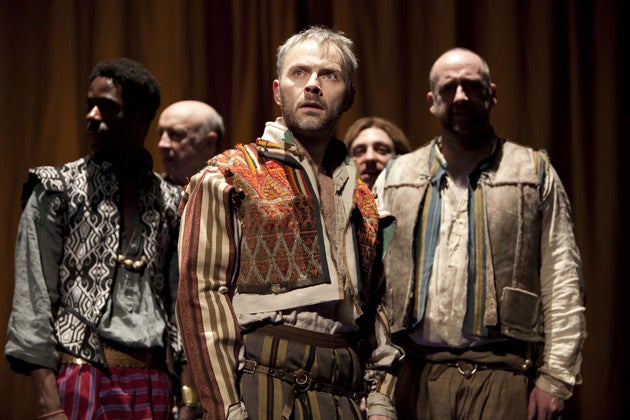Dido, Queen of Carthage, Cottesloe, National Theatre London

Apart from a garbled version in the Globe six years ago, Marlowe's first play is barely known and the first thing to say about this riveting revival by James Macdonald is: about bloody time, too! References to the play crop up in Hamlet and A Midsummer Night's Dream, and you could say that Antony and Cleopatra is in some ways a rewrite.
But Marlowe does so many astonishing things that just to have it laid out in so intelligent a fashion will do. Beyond that, Anastasia Hille as Dido is queen of not just Carthage but also neurasthenia. She and her sister Anna (Sian Brooke) are clearly damaged psychological goods, making suicide a plausible modern option when all hope and friendship finally evaporates.
Macdonald sees Dido as a wounded creature, her seduction of Mark Bonnar's full-chested, powerful Aeneas an act of desperation in itself. The famous scene in the cave is the crux of the play, both parties exhaling post-coital pleasure: "If he forsakes me not, I never die; For in his looks I see eternity, and he'll make me immortal with a kiss."
Sticking closely to the first, second and fourth books of the Aeneid, Marlowe still deviates dramatically in the character of Iarbus (Obi Abili), a neighbouring African king. Anna becomes her own sister's rival for his love. And 800 lines on the Fall of Troy are compressed to just 180 in Marlowe's magnificent rolling verse.
Bonnar delivers that speech haunted by memories. The intensity of human passion outstrips the trivial intervention of the gods: Jupiter's opening bitchiness ("Come gentle Ganymede and play with me, I love thee well, say Juno what she will") and Venus's (Siobhan Redmond) maternal gibbering are soon relegated to the sidelines. But the dies are cast.
Dido takes Aeneas on a tour of her gallery of suitors, a remarkable scene played by the actors with gazes fixed above our heads. Aeneas, like Antony, dithers in his mission to fulfil a military and political destiny in Italy. The understated design of Tobias Hoheisel and lyrical music of Orlando Gough sustain a mood of hushed intensity that leads inexorably to the grisly compilation of Dido's funeral pyre. The show's a serious pleasure.
To 2 June (020 7452 3000; www.nationaltheatre.org.uk)
Subscribe to Independent Premium to bookmark this article
Want to bookmark your favourite articles and stories to read or reference later? Start your Independent Premium subscription today.

Join our commenting forum
Join thought-provoking conversations, follow other Independent readers and see their replies